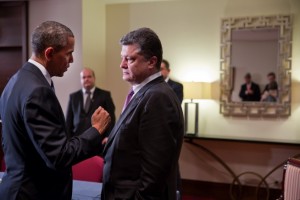Cross-posted from Consortium News
Sometimes in dealing with the U.S. government and its compliant mainstream media, I'm left with the feeling that if it weren't for double standards, there would be no standards at all. From President Barack Obama to the editors at the Washington Post and the New York Times, it's obvious that what's good for the goose is not good for the gander.
An election in an embattled country is valid and even inspiring if it turns out the way Official Washington wants, as in Ukraine last month; otherwise it's a sham and illegitimate, as in Syria this month.
When it comes to military interventions, U.S. officials such as Ambassador to the United Nations Samantha Power assert a "responsibility to protect" transcending national sovereignty if civilians are threatened in Libya or in Syria, but not when the civilians are being slaughtered in Gaza, Odessa, Mariupol or Donetsk. When those killings are being done by U.S. allies, the allies are praised for their "restraint."
The hypocrisy extends to the application of international law. If some leaders in Africa engage in actions that cause civilian deaths, they must be indicted by the International Criminal Court and dragged before The Hague for prosecution by jurists representing an outraged world.
But it's unthinkable that there would be any accountability for George W. Bush, Dick Cheney, Tony Blair and other "respectable" leaders who invaded Iraq and caused the deaths of hundreds of thousands last decade.
The United States also presents itself as the great guardian of democracy and constitutional order, except when those democratic impulses conflict with U.S. interests. Then, the American people are treated to the cognitive dissonance of overthrowing democratically elected governments in the name of "democracy." [See Consortiumnews.com's "America's Staggering Hypocrisy."]
The Ukraine Case
When Ukraine's elected President Viktor Yanukovych rejected austerity demands from the International Monetary Fund that accompanied a plan for European association, senior U.S. officials decided that Yanukovych had to go and urged on protests, ultimately spearheaded by neo-Nazi militias, that violently overthrew Yanukovych on Feb. 22.
The U.S. State Department's "public diplomacy" officials then spun a narrative that glued white hats on the putschists and black hats on those who sought to defend the elected government. Whenever people mentioned the inconvenient truth about the crucial neo-Nazi role in providing the muscle for the coup, they were accused of spreading "Russian propaganda."
Yet, while U.S. meddling in the internal affairs of another country is a good thing, it is a bad thing if a U.S. adversary does the same or is just suspected of doing the same.
When American and French volunteers go to Syria to fight with the U.S.-backed rebels, those volunteers are, of course, operating on their own (such as American suicide bomber Abu Hurayra Al-Amriki). To suggest otherwise without proof would be a "conspiracy theory," a point with which I would agree .
But, remember, the rules are flexible; while the U.S. press corps would mock anyone who jumped to a conclusion that the American and French jihadists in Syria must have connections to Washington and Paris, the opposite assumption applies to any disfavored government; then, the U.S. press just "knows" that some indigenous resistance must be directed from some nefarious foreign capital.
For example, the U.S. government is accusing Russia of somehow being behind the unrest in eastern Ukraine, Yanukovych's political base, even though the unparalleled U.S. intelligence agencies and American journalists on the ground have been unable to detect any proof of this alleged direction from Moscow.
Still, the assumption led the New York Times to get suckered into a State Department propaganda ploy when the Times ran a lead story based on photographs supposedly showing covert Russian military teams that were "clearly" in Russia but then popped up in eastern Ukraine.
Two days later, however, the Times was forced to retract its scoop when it turned out that a key photo purportedly taken in Russia had actually been snapped in Ukraine, destroying the story's premise. [See Consortiumnews.com's "NYT Retracts Ukraine Photo Scoop."]
(Note: You can view every article as one long page if you sign up as an Advocate Member, or higher).






